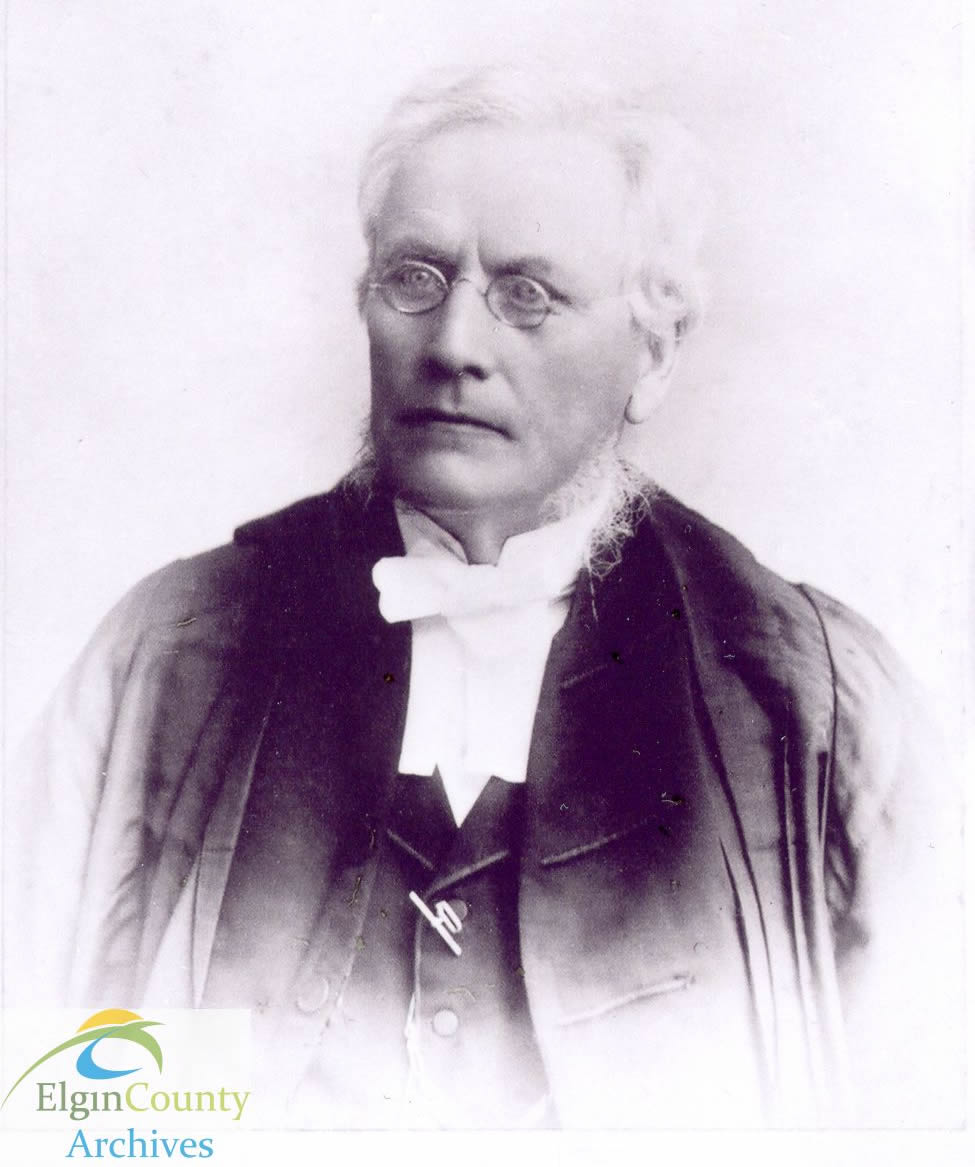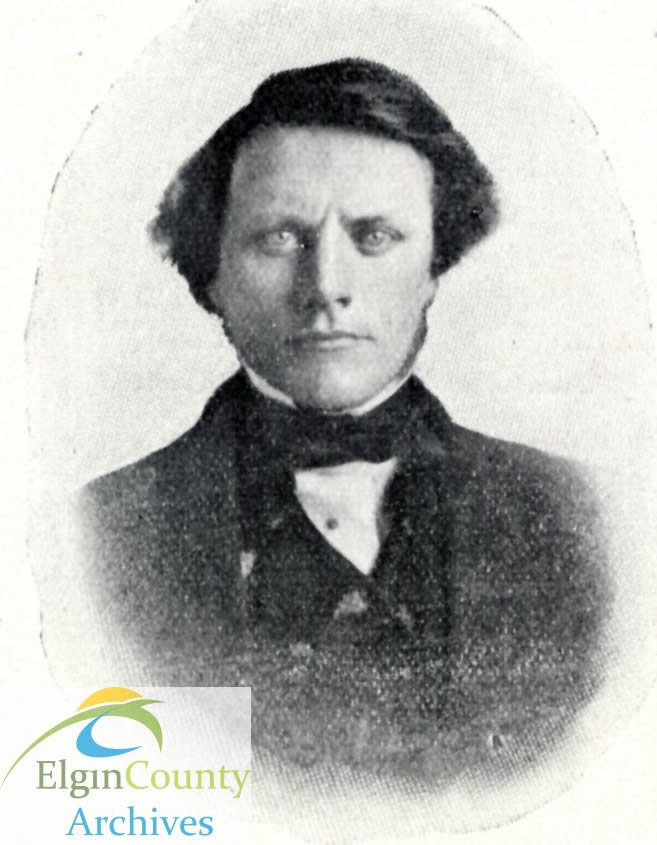David John Hughes
David John Hughes (1820-1915) was born in England and came to Upper Canada as a child. The biography below, from the 1914 issue of St. Thomas and its Men of Affairs explains much of his early education and his professional life.
“D. J. Hughes
Senior Judge. County of Elgin (retired)Born at Kingsbridge, South Devon, England, May 7th, 1820. His father was a dissented minister and immigrated to Canada in 1832, settling at Montreal, where he died shortly afterwards. The fatherless boy was adopted by Mr. Gideon Ackland, a lawyer who lived in Perth, but owing to a change in Mr. Ackland’s circumstances, Mr. Hughes then entered the employ of the Hon. Malcolm Cameron in the publication of the Bathurst Courier.
In 1835 he removed to the London district where he was adopted by brother-in-law, the late Hon. John Wilson, the leading lawyer of the western circuit. Here he received his education in the London grammar schools and afterwards as a student in Mr. Wilson’s law office.
Mr. Hughes was called to the Bar in Michaelmas term in 1842; settled at Woodstock and practiced his profession there until 1847, when he entered partnership with the Hon. John Wilson, remaining in London until October 1853.
He was appointed Judge of Elgin County upon its separation from Middlesex in the year 1853 and was retired by Act of Parliament on account of age in 1903.
Judge Hughes ranks as probably the oldest distinguished resident of St. Thomas.
He was present at the laying of the corner stone of the St. Thomas court house in 1852 and held the first court of the new county in the old town hall, and the first court in the new court house in 1854.
He is a protestant to the backbone and in politics a Baldwin Reformer.
Residence: 114 Metcalfe street.”
When Judge Hughes passed away on April 14, 1915, his lengthy obituary on the front page of The Times gave additional insight into his life.
"In June, 1837, he entered the Law Society at Osgoode Hall as a student, being called to the bar of Upper Canada in 1842. During the rebellion of 1837 he joined the London troop of cavalry. Ever afterward Judge Hughes was an ardent admirer of horses and was one of the best handlers of the ribbons in St. Thomas. He was appointed master extraordinary and examiner in chancery by Vice Chancellor Jameson for the London district, and on Dec. 13, 1843, began the practice of the law in Woodstock, remaining there until September, 1847, when he went to London and entered into partnership with Mr. Wilson with whom he practiced until he was appointed judge of the county and surrogate court in Elgin, in October, 1853. Judge Hughes held assize courts at the request of justices of the high court in twenty-seven different counties of the province. He was retired by Act of Parliament on account of his age in 1903. Judge Hughes was married on Dec. 13, 1843 to Miss Sarah Richardson, eldest daughter of the late Richard Richardson, cashier of the Bank of Upper Canada London, Ont., and a sister of the Mr. Justice Richardson of Regina, N.W.T.. Mrs. Hughes predeceased her husband a number of years ago. His second wife, who survives was Miss Addie Rowland of St. Thomas.”
 Judge Hughes was predeceased by his wife Sarah Richardson Hughes (d.1903) and four children: his son Llewelyn (d. 1887) and daughters Christina (d.1901), Emma Elizabeth Kains (d.1911) and Alice.
Judge Hughes was predeceased by his wife Sarah Richardson Hughes (d.1903) and four children: his son Llewelyn (d. 1887) and daughters Christina (d.1901), Emma Elizabeth Kains (d.1911) and Alice.
He was survived by his second wife, the former Maria Adelaide “Addie” Rowland, whom he married in London in 1905 and four children, Mrs. Susan Douglas of Toronto; Mrs. Edith Wahaulpter of Chicago; Miss Eleanor Hughes of St. Thomas and Edward Hughes of western Canada.
He was rarely involved with public initiatives, but was a member of the board for the St. Thomas grammar school and a founding stockholder of the Bank of the County of Elgin.
An editorial on page two of The Times on the day he died, spoke to his character:
Judge Hughes
The death of His Honor Judge Hughes marks the close of a long and remarkable career. His wonderful vitality, nearly a quarter of a century after having passed the milestone of man’s allotted span, had for years rendered the venerable jurist of a notable figure in the life of the community. With a record of one year more than half a century actually presiding on the bench of our courts of law, the late Judge Hughes was for many years a dominating personality in legal circles in this country. A man of fixed convictions and unalterable principles of the highest order, he dispensed justice impartially according to the dictates of his well balanced legal mind, and to his careful interpretation of the statues of the land. His grave, scholarly and stern cast of countenance masked a kindly spirit and his keen, shrewd eye could twinkle with whatever humor appealed to him. While undoubtedly he owed his longevity and splendid constitution largely to the sturdy stock from which he descended, he also owed much to his rational mode of life and the fact that his constitution never suffered ill-treatment at his hands. The name of His Honor Judge David John Hughes will ever be inseparably bound up with the annals of Elgin and, to some extent, Middlesex, counties. His passing severs one f the fast disappearing links connecting Elgin county and St. Thomas with the early days of development in every walk of life.

